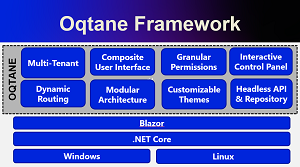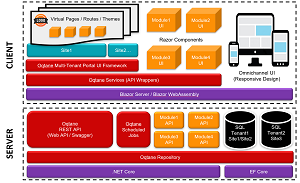News
Modular Blazor App Framework Oqtane Boosts Templates
The Oqtane project -- a modular application framework for Blazor -- has been updated with more templating functionality, along with user experience (UX) improvements and fixes.
Supported by the .NET Foundation, the open source Oqtane Framework created by Shaun Walker was inspired by an earlier creation of his, the DotNetNuke open source .NET content management system (CMS). Running on .NET 5, it supports:
- Multi-tenancy
- A fully dynamic page compositing model
- Designer-friendly skins
- Extensibility via third party modules
- A familiar data model
"Oqtane is a modular application framework which accelerates the development of modern digital experiences," the .NET Foundation said recently in showcasing the project. "It was architected from the ground up to utilize Blazor, a modern single-page application framework for building interactive web apps with C# and .NET. Oqtane offers advanced capabilities such as multi-tenancy, a fully dynamic page compositing model, designer friendly themes, extensibility via third party plug-in modules, a headless API, and supports Blazor Server and Blazor WebAssembly hosting models."
 [Click on image for larger view.] Oqtane (source: Project Oqtane).
[Click on image for larger view.] Oqtane (source: Project Oqtane).
The new v2.0.2 update includes mostly assorted fixes and UX improvements, headed by improvements to templates.
"One of the core philosophies of Oqtane is to be a 'low ceremony 'framework that simplifies the effort required in order for a developer to come up to speed with the framework," Walker said in an April 19 blog post. "One of the best ways to achieve this goal is to provide functional templates that developers can utilize as the basis for their own solutions. A Module Creator was introduced in version 1.x to enable developers to quickly scaffold custom modules and the concept has been extended in the latest version with a Theme Creator as well as the ability to create custom local templates."
 [Click on image for larger view.] Oqtane Architecture (source: Project Oqtane).
[Click on image for larger view.] Oqtane Architecture (source: Project Oqtane).
The update also improved app customization with the project's theming feature, with a community member adding the ability for a theme to include custom settings for both theme and container components. Notifications -- specifically asynchronous emails -- were also improved with the ability to test SMTP server configurations to ensure the settings are configured properly for a site.
Yet another tweak eases the process of completely emptying the Octane recycle bin.
Coming up next month in a more substantial v2.1.0 update, according to the roadmap, are:
- Cross-platform database support (ie. SQLite )
- EF Core migrations for database installation/upgrade
Noting that Oqtane was the subject of a .NET Community Standup earlier month in which he participated, Walker said, "This release includes 36 pull requests submitted by 6 different contributors, pushing the total number of project commits all-time to nearly 1,800. The Oqtane framework continues to evolve at a rapid pace to meet the needs of .NET developers." As of this writing, the project's GitHub site shows it has 853 stars and 236 forks.
About the Author
David Ramel is an editor and writer at Converge 360.